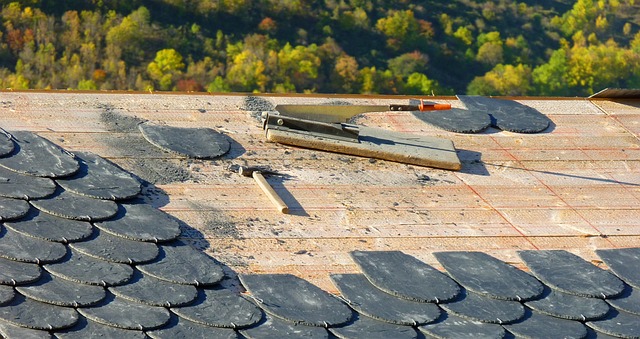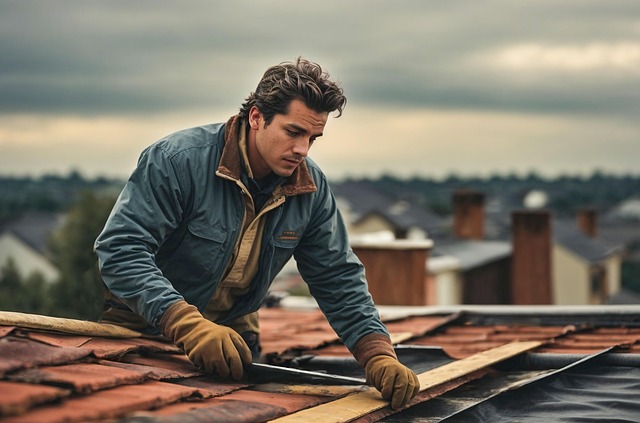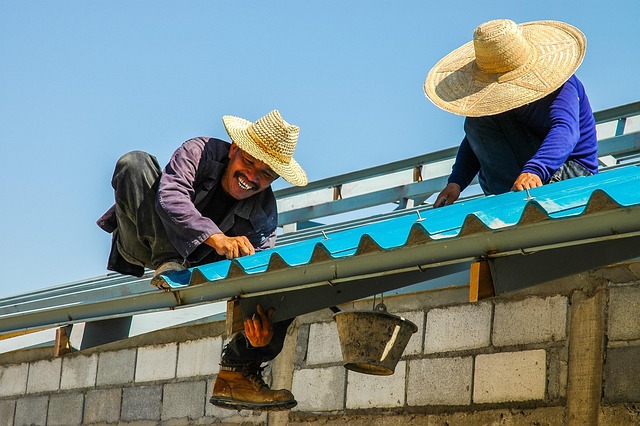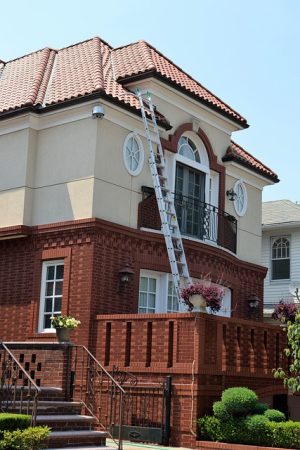In Houston, understanding flat and sloped roofs is essential for property owners and contractors. Flat roofs are cost-effective and easier to maintain, while sloped roofs facilitate better water drainage. Houston roofers specialize in these varieties, requiring precise measurements and angle calculations. They use high-quality materials and advanced techniques for installations. The city's roofers offer a diverse range of materials like EPDM, TPO, PVC, metal, and tile. Choosing the right system impacts operational efficiency and long-term sustainability, with benefits including cost-effectiveness, durability, low maintenance, and functionality. Regular inspections and repairs are crucial for maintaining structural integrity and preventing costly replacements.
“Houston roofers specializing in flat and sloped roof installations for both residential and commercial properties. This comprehensive guide explores key aspects of roofing, including an in-depth look at flat vs. sloped roofs in Houston’s unique climate. Discover the expertise behind our installation process, the materials that ensure top-quality solutions, and the benefits tailored to commercial spaces. Learn about common residential roof issues and maintenance tips to keep your property safe and protected.”
- Understanding Roof Types: Flat vs. Sloped for Houston Properties
- The Expertise of Houston Roofer: Installation Process
- Materials Used: Choosing the Right Roofing Solution
- Benefits and Considerations for Commercial Spaces
- Common Issues and Maintenance Tips for Residential Roofs
Understanding Roof Types: Flat vs. Sloped for Houston Properties

In Houston, understanding the distinct characteristics of flat and sloped roofs is essential for any property owner or contractor. Both styles present unique advantages and considerations when it comes to installation and maintenance. Flat roofs, as the name suggests, offer a level surface, making them easier to walk on and maintain, especially in urban settings where access might be limited. This design is popular for commercial buildings due to its cost-effectiveness and low material requirements. On the other hand, sloped roofs are characterized by their inclined surfaces, which allow for better water drainage, preventing ponding and potential damage. These roofs are a common sight on residential properties in Houston’s diverse climate.
Houston roofers often encounter a mix of these roof types, requiring specialized skills to ensure optimal performance and longevity. Sloped roofs, for instance, demand precise measurements and angle calculations to achieve efficient water flow, preventing leaks. Conversely, flat roofs necessitate careful preparation of the substrate to create a smooth, level surface suitable for various finishing options, such as membranes or coatings.
The Expertise of Houston Roofer: Installation Process

When it comes to installing roofs in Houston, expertise matters. Houston roofer professionals are well-versed in handling both flat and sloped roofs for a range of properties. Their process begins with a thorough assessment of the structure and weather conditions to ensure the best fit for each project. Using high-quality materials and state-of-the-art techniques, these experts meticulously lay down underlayments, install shingles or tiles, and seal off joints to guarantee durability.
The installation itself is a meticulous dance, requiring precision and attention to detail. Houston roofer teams work systematically, from the perimeter to the center, ensuring each section is secure before moving on. They navigate challenges like varying slopes, roof contours, and even unusual architectural features with ease, thanks to their extensive training and experience. The end result? A robust, weather-resistant barrier that safeguards homes and businesses alike for years to come.
Materials Used: Choosing the Right Roofing Solution

When it comes to materials, Houston roofers have a wide array of options to choose from. The right roofing solution depends on factors like climate, budget, and desired aesthetic. For flat roofs, popular choices include EPDM (ethylene propylene diene monomer) rubber, TPO (thermoplastic olefin), and PVC (polyvinyl chloride). These materials are durable, cost-effective, and easy to install—ideal for commercial buildings seeking low maintenance.
For sloped roofs, traditional options like asphalt shingles remain a popular choice among Houston roofers due to their affordability and ease of installation. However, metal roofing is gaining traction for its longevity, resistance to extreme weather, and energy efficiency. In addition, tile roofs offer a premium aesthetic appeal but require more specialized installation skills and may be costlier. The right material selection ensures not just a sturdy roof but also enhances the property’s curb appeal.
Benefits and Considerations for Commercial Spaces

For commercial spaces, choosing the right roofing system is a strategic decision that influences operational efficiency and long-term sustainability. Houston roofers specializing in flat and sloped roofs offer several advantages tailored to meet the unique demands of commercial properties. One key benefit is cost-effectiveness, as these roofing solutions are often more affordable than traditional pitched roofs, making them an attractive option for businesses looking to balance budget constraints with quality. Moreover, flat roofs provide ample space for additional uses like solar panel installation or outdoor seating areas, enhancing the property’s functionality and value.
When considering a commercial roof, Houston roofer experts also emphasize the importance of durability and low maintenance. Sloped roofs, for instance, effectively manage water runoff, reducing the risk of leaks and prolonging the lifespan of the roofing material. Flat roofs, while requiring regular inspection for potential damage, offer superior resistance to extreme weather conditions compared to pitched roofs. This is especially crucial in areas prone to intense storms or high winds. Ultimately, selecting the appropriate roofing system for your commercial property involves a careful balance between budget, functionality, and longevity—a key aspect where Houston roofers can provide expert guidance.
Common Issues and Maintenance Tips for Residential Roofs

Roofs are a crucial component of any residential or commercial building, providing protection from the elements and ensuring structural integrity. However, they can be prone to several common issues that Houston roofers often encounter. One of the most frequent problems is leaks, which can be caused by faulty installation, damaged shingles, or aging materials. Regular inspection and prompt repair are essential to prevent extensive damage and costly replacements.
Maintenance is key to prolonging the lifespan of your roof. Homeowners should schedule professional inspections at least once a year to identify potential issues early on. Cleaning gutters regularly, repairing loose shingles, and sealing cracks around vents and chimneys can significantly reduce the risk of water intrusion and other related problems. By keeping up with these simple yet effective maintenance tips, Houston roofers can help ensure your roof remains in top condition for years to come.
When it comes to roofing in Houston, whether for a residential or commercial property, choosing the right type and materials is essential. This article has guided you through the intricacies of flat versus sloped roofs, the installation process, and the benefits of each for specific property types. With Houston’s diverse weather conditions, understanding these aspects is crucial for ensuring your roof’s longevity and protection. So, if you’re in need of expert Houston roofers, remember that the right roofing solution can safeguard your space and enhance its value.
